Chapter 4
Text Completion and Sentence Equivalence: The Easiest Verbal Questions
In This Chapter
 Learning about the Text Completion and Sentence Equivalence questions
Learning about the Text Completion and Sentence Equivalence questions
 Establishing an effective strategy for identifying the correct answer
Establishing an effective strategy for identifying the correct answer
 Attacking questions confidently with a three-step approach
Attacking questions confidently with a three-step approach
 Tackling more challenging questions
Tackling more challenging questions
Text Completion and Sentence Equivalence questions are the gimmies of the GRE because the questions and possible answers hold all the clues you need to answer these questions correctly. By using key strategies and avoiding common mistakes as described in this chapter, you can breeze through these questions and rack up points in a hurry. If you find the vocabulary is slowing you down, turn to Chapter 7 for words you’re likely to encounter and their definitions.
Grasping Text Completion and Sentence Equivalence Questions
Because Text Completion and Sentence Equivalence questions are so similar, the strategy is the same for both, and it makes sense to cover them both in one chapter:
 Text Completion: A Text Completion question consists of a sentence or paragraph with one, two, or three blank spaces for a missing word(s) or phrase(s). Following the sentence or paragraph are choices for filling in the blank(s): five choices if the sentence has only one blank or three choices for each blank if the sentence has two or three blanks. Your job is to choose the most suitable word or words. Although all the answers may sound okay in the sentence, only one is correct for each blank.
Text Completion: A Text Completion question consists of a sentence or paragraph with one, two, or three blank spaces for a missing word(s) or phrase(s). Following the sentence or paragraph are choices for filling in the blank(s): five choices if the sentence has only one blank or three choices for each blank if the sentence has two or three blanks. Your job is to choose the most suitable word or words. Although all the answers may sound okay in the sentence, only one is correct for each blank.
 Sentence Equivalence: A Sentence Equivalence question consists of a single sentence with exactly one word missing and six answer choices. You’re required to select the two words that fit the sentence and mean the same thing, and you don’t get partial credit for choosing only one of the correct words.
Sentence Equivalence: A Sentence Equivalence question consists of a single sentence with exactly one word missing and six answer choices. You’re required to select the two words that fit the sentence and mean the same thing, and you don’t get partial credit for choosing only one of the correct words.
The following at-a-glance table shows you what to expect from the variations of Text Completion and Sentence Equivalence questions. Don’t worry about mixing this up: On the GRE, the number of blanks and choices for the Text Completion questions are obvious, and Sentence Equivalence questions with too few or two many answers selected are marked “Incomplete” in the review screen following the Verbal section, which means you can go back and correct them with the time remaining on the section.

The following example of a Text Completion question shows how all answer choices appear to fit perfectly, but only two specific words actually make logical sense.
Directions: For each blank, select one entry from the corresponding column of choices. Fill all blanks in the way that best completes the text.
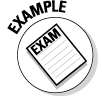 Frustrated at having to spend the entire weekend studying for the GRE instead of going hang gliding, Faye (i)_____ her book out the window with such (ii)_____ that it soared high into the sky, prompting three of her neighbors to capture it on video with their cellphones.
Frustrated at having to spend the entire weekend studying for the GRE instead of going hang gliding, Faye (i)_____ her book out the window with such (ii)_____ that it soared high into the sky, prompting three of her neighbors to capture it on video with their cellphones.
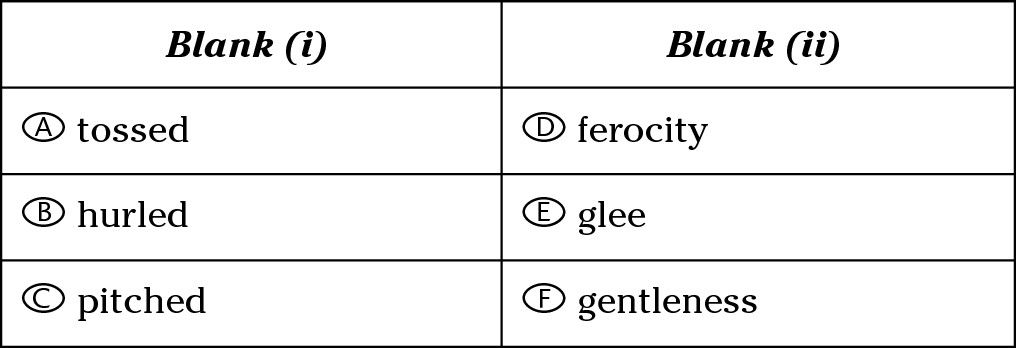
The keyword in this example is frustrated, which conveys a strong negative emotion. Choices (B) and (D), hurled and ferocity, are the only choices that support such a negative emotion. Note that this is a single, two-part question. You may select any of the three answer choices for each blank, but you must choose both correct answers to earn credit for the question.
The following example of a Sentence Equivalence question shows how all six answer choices appear to fit within the sentence structure, but only two answers actually support the meaning of the sentence.
Directions: Select the two answer choices that, when used to complete the sentence, fit the meaning of the sentence as a whole and produce two completed sentences that are alike in meaning.
 Well-prepared and ready to take on the GRE, Billy _____ the test and made his family proud.
Well-prepared and ready to take on the GRE, Billy _____ the test and made his family proud.
A aced
B missed
C passed
D held
E took
F knew
The sentence suggests that Billy did very well on the GRE. The best words to convey GRE success are aced and passed, making Choices (A) and (C) the correct answers. Again, you must select both of these correct answers to earn credit for the question.
Developing Your Skills for Finding the Correct Answers
Text Completion and Sentence Equivalence questions are designed to measure three core proficiencies of the test-taker (you): interpreting the sentence; using vocabulary properly; and recognizing irony, figures of speech, and formal diction. By understanding what the test-makers are testing for, you significantly improve your chances of correctly answering their questions.
The following sections give you an overview of these three proficiencies and how you can spot the correct answers. These proficiencies always lead you to the correct answer and, with practice, are very easy to apply.
Interpreting the sentence
Interpreting a sentence consists of determining its meaning in the absence of the missing words. By knowing the meaning of the sentence prior to looking at the possible answers, you can quickly eliminate choices that don’t make sense. This technique is the single most important skill for working these verbal questions, and the GRE-makers have fun trying to trick you. No worries, though, this section (and the rest of the chapter) is packed with methods for interpreting sentences.
Directions: Select the two answer choices that, when used to complete the sentence, fit the meaning as a whole and produce two completed sentences that are alike in meaning.
 The bags were so heavy, we could _____ lift them.
The bags were so heavy, we could _____ lift them.
A easily
B hardly
C fully
D nearly
E barely
F effortlessly
Even without the missing word, you can construe the meaning of the sentence. The phrase so heavy clues you in that these bags are difficult or impossible to lift. After realizing this, you can immediately eliminate easily and effortlessly. The words fully and nearly are a little tougher to ignore, but they really don’t make sense either. The correct answers are Choices (B), hardly, and (E), barely.
Using vocabulary properly
After interpreting the sentence, the next step is to pick the right word. Proper usage helps determine the right word. (Usage is the customary manner of using particular words.)
Directions: For each blank, select one entry from the corresponding column of choices. Fill all blanks in the way that best completes the text.
 The lights _____ when the engineer hit the kill switch.
The lights _____ when the engineer hit the kill switch.
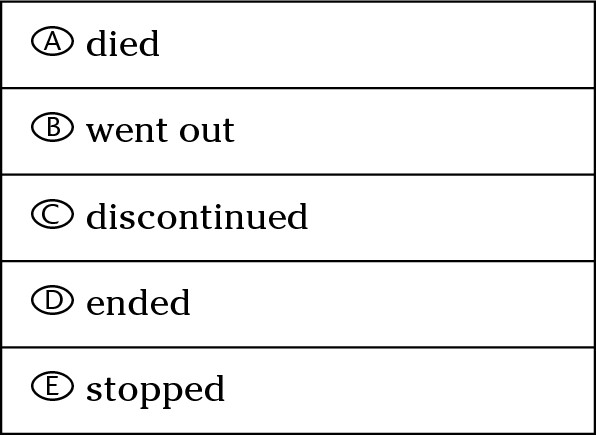
Each word choice supports the sentence meaning, but only one is properly used. Although the sentence does use the word kill, lights don’t die, stop, discontinue, or end — they go out. The correct answer is Choice (B).
Recognizing irony, figures of speech, and formal diction
Even if the answer choices support the sentence meaning, subtle nuances in the meaning of words can separate wrong answers from right ones. Examine answer choices for skepticism, doubt, uncertainty, and emotional connotations that just don’t fit.
Directions: Select the two answer choices that, when used to complete the sentence, fit the meaning of the sentence as a whole and produce two completed sentences that are alike in meaning.
 I’m _____ at how good your GRE score is — I knew you could do it!
I’m _____ at how good your GRE score is — I knew you could do it!
A ecstatic
B stunned
C thrilled
D shocked
E dumbfounded
F amazed
All the choices convey surprise, but stunned, shocked, dumbfounded, and amazed sound as if the person speaking doubted your abilities. Because the second half of the sentence doesn’t convey any doubt (“I knew you could do it!”), the correct answers are Choices (A) and (C).
Attacking the Question Head-On
Whether you’re faced with Text Completion or Sentence Equivalence questions, your battle plan is the same: Attack each question with confidence. Hesitation and doubt can waste time and make you talk yourself out of the right answer. Instead, use this three-step strategy:
1. Read and interpret the sentence while covering the answer choices.
2. Fill the blanks with your own words.
3. Eliminate answer choices that don’t match your words.
The following sections explain these steps in detail.
Read and interpret the sentence while covering the answer choices
When working Text Completion and Sentence Equivalence questions, your first step is to interpret the sentence for its meaning. If you know what the sentence is saying, then you have a better understanding of which words best fill in the blanks. Althought that seems obvious, many test-takers skip this step.
The following example illustrates the different meanings that a sentence can convey, using different words in the blanks. If you first try out all the answer choices, it becomes impossible to tell what the sentence is actually saying, so they’re not shown here yet.
 Having been coerced by her mother into accepting a blind date, Mitzi was (i)_____, although Marty, surprisingly, turned out to be (ii)_____.
Having been coerced by her mother into accepting a blind date, Mitzi was (i)_____, although Marty, surprisingly, turned out to be (ii)_____.
Ask yourself the following questions: Was Mitzi pleased or disappointed? Was Marty, her date, surprisingly handsome or unremarkable? One key skill to doing well on the Text Completion questions is the ability to interpret sentences that are missing keywords.
A mother’s coercive date suggestion (sorry, Mom) is probably lame, so it’d be surprising if the date were attractive. That’s how you know what the sentence is trying to say.
Fill the blanks with your own words
The next step to solving the Text Completion and Sentence Equivalence problems is to think of your own words to fill in the blanks. Your words don’t have to be perfect — you’re not writing the sentence — but they do have to support the meaning of the sentence and, by extension, the meanings of the blank words themselves. By using this technique, you know exactly what to look for and can eliminate some answer choices (which is the next step). Right now, you’re still covering up the answer choices with your scratch paper.
Having been coerced by her mother into accepting a blind date, Mitzi was uninterested, although Marty, surprisingly, turned out to be good looking.
You already know that Mitzi wasn’t looking forward to tonight, but Marty happened to exceed her expectations.
Eliminate answer choices that don’t match your words
The last step to answering Text Completion and Sentence Equivalence questions is to go ahead and look at the answer choices. Knowing what the sentence is saying makes the right answer obvious.
Here’s the example question again, this time with the answer choices provided.
Directions: For each blank, select one entry from the corresponding column of choices. Fill all blanks in the way that best completes the text.
 Having been coerced by her mother into accepting a blind date, Mitzi was (i)_____, although Marty, surprisingly, turned out to be (ii)_____.
Having been coerced by her mother into accepting a blind date, Mitzi was (i)_____, although Marty, surprisingly, turned out to be (ii)_____.
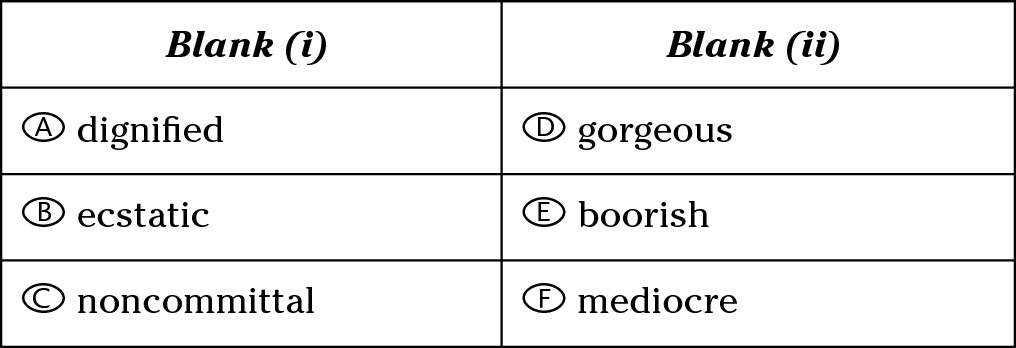
Compare the answer choices, one at a time, to the words you already came up with on your own (uninterested and good looking). Cross dignified off the list, because it has nothing to do with disinterest. Similarly, boorish has nothing positive about it. Mitzi couldn’t possibly be ecstatic about having been coerced and the word although tells you that Marty’s mediocrity wouldn’t be a pleasant surprise, so eliminate these answers. The correct answers are Choices (C), noncommittal, and (D), gorgeous. Both closely fit the predictions and make sense when you read them back into the sentence.
Overcoming Tricky Sentences
If solving every Text Completion and Sentence Equivalence question were as easy as the questions in the preceding section, every test-taker would get a perfect 170 on the Verbal section (those test-takers who read this book, anyway). However, these questions can be difficult to interpret. When you come across trickier sentences, you want to utilize the three basic strategies mentioned in the preceding section and build on them with the following three steps:
1. Identify transition words and use them to get the gist of the phrases.
2. Break the sentence into smaller pieces.
3. Check one word blank at a time to eliminate answer choices.
The following sections delve further into these steps.
Identify transition words and use them to get the gist of the phrases
Transition words exist in almost all GRE Text Completion and Sentence Equivalence questions and serve as valuable clues to interpreting the meaning of a sentence. (Transition words connect two ideas in a sentence or paragraph and tell you whether the two ideas in the sentence agree or contradict one another.) Understanding just how significantly a transition word can affect the meaning of a sentence enables you to use these words to decipher the meaning of a sentence in the absence of certain words.
For example, changing the transition word in the following sentence completely alters its meaning.
Although he ran as fast as he could, Eric _____ the bus.
The transition word although, indicating contrast, tells you that Eric missed the bus. Consider the same sentence with a different transition word:
Because he ran as fast as he could, Eric _____ the bus.
The transition word because, indicating cause and effect, tells you that Eric caught the bus.
With a little practice, transition words become easy to identify and use to your advantage. They’re helpful when breaking the sentence into pieces (which is the next step) and are used frequently in the Analytical Writing portion of the GRE. (See the chapters in Part IV for more on the Analytical Writing essays.)
Common transition words include the following:
although
and
but
despite
either/or
however
in spite of
moreover
nonetheless
therefore
or
In the previous example sentence, changing the transition word although to because changes the entire meaning of the sentence. Note that the transition word isn’t always between the phrases. In this next example, use the transition word to help interpret the sentence.
 Although she usually was of a (i)_____ nature, Patty was (ii)_____ when she heard the history professor assign a paper due the first day back after spring break.
Although she usually was of a (i)_____ nature, Patty was (ii)_____ when she heard the history professor assign a paper due the first day back after spring break.
The transition word although tells you that Patty’s usual nature is different from the way she felt when receiving her assignment.
Break the sentence into smaller pieces
Sometimes the sentences are so long and convoluted that you can’t make much sense of them. To handle tricky questions, break the sentence into pieces to simplify the interpretation before adding your own words. The simplest way to do this is to separate the phrases, usually indicated by commas.
Continuing with the example from the previous section, break the sentence into the two following parts:
Patty was _____ when she heard the history professor assign a paper.
and
Although she usually was of a _____ nature,
In smaller pieces, the gist of this sentence is easier to discern. One phrase describes how Patty felt when receiving the assignment, and the other phrase describes how she usually feels. You know from the transition word although that the words are probably dissimilar in meaning. You can also figure out that the first blank needs a word like happy, and the second blank, with an opposite meaning indicated by although, needs a word like sad.
Check one word blank at a time to eliminate answer choices
Although many of these types of questions feature only one word blank, some Text Completion questions have two or three blanks. You may not always be able to match all the blanks, especially on the more difficult questions. After you think of your own words to go in the blanks, the best strategy is to eliminate the answer choices one word at a time. So even if you’re unable to match all the words, you can still eliminate a few wrong answer choices and select from a smaller group of answers.
Directions: For each blank, select one entry from the corresponding column of choices. Fill all blanks in the way that best completes the text.
 Although she usually was of a (i)_____ nature, Patty was (ii)_____ when she heard the history professor assign a paper that would be due the first day back after spring break.
Although she usually was of a (i)_____ nature, Patty was (ii)_____ when she heard the history professor assign a paper that would be due the first day back after spring break.

Now look at the answer choices and eliminate those that don’t match the words you used to fill the blanks (happy and sad). Start with the first blank.
Using your first word clue, happy, which word from the first column of choices best describes Patty’s nature? Frugal doesn’t fit based solely on its meaning (economical), and it has no opposite in the second column. Keen really doesn’t fit based simply on usage (described in the earlier section “Using vocabulary properly”). Cheerful seems to be the right choice for the first blank. In the second column, enigmatic means mysterious or cryptic, which really doesn’t fit. If you don’t know what lugubrious or ebullient means, you can make a pretty good guess that lugubrious is heavy and ebullient is upbeat, based on how the words sound. If that’s the case, the transition word although rules out ebullient because the two words (cheerful and ebullient) are too similar. So lugubrious is the best choice. The correct answers are Choices (C) and (E).
If you know the definition of the second word, you can use it to support your answer choice: Ebullient means very happy, lugubrious means sad, and enigmatic means mysterious. (Flip to Chapter 7 for a lot more vocabulary.)
Getting Your Hands Dirty with Practice Questions
You’re ready to tackle some practice Text Completion and Sentence Equivalence questions to get a better grasp of how to solve them on your own by using all the tools described in this chapter.
Text Completion questions
Directions: For each blank, select one entry from the corresponding column of choices. Fill all blanks in the way that best completes the text.
1. As a public relations specialist, Susan realizes the importance of kindness and _____ when dealing with even the most exasperating tourists.
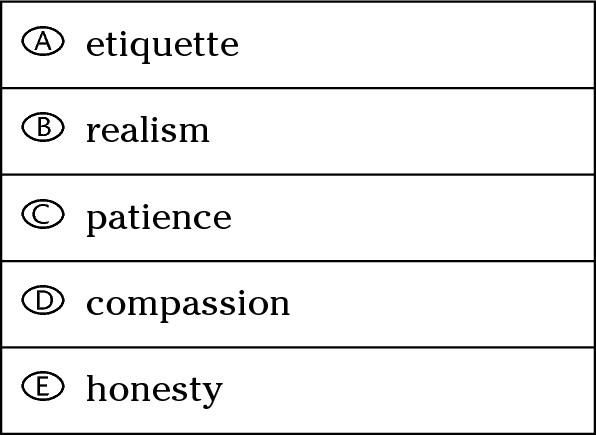
First, ask yourself: What’s important when dealing with exasperated tourists? A public relations specialist would need to be polite. The first word choice, etiquette, looks good, but you don’t treat someone with etiquette. (Etiquette is a system of rules for manners.) Check that word off the list. You don’t show exasperated tourists compassion, either. Gone. Honesty won’t help. Gone! Realism isn’t even close. Gone! Through logic and elimination, the correct answer is Choice (C).
2. Enabled by his (i)_____ and unimpeded by any sense of (ii)_____, Henry reached the end of the Ironman Triathlon.
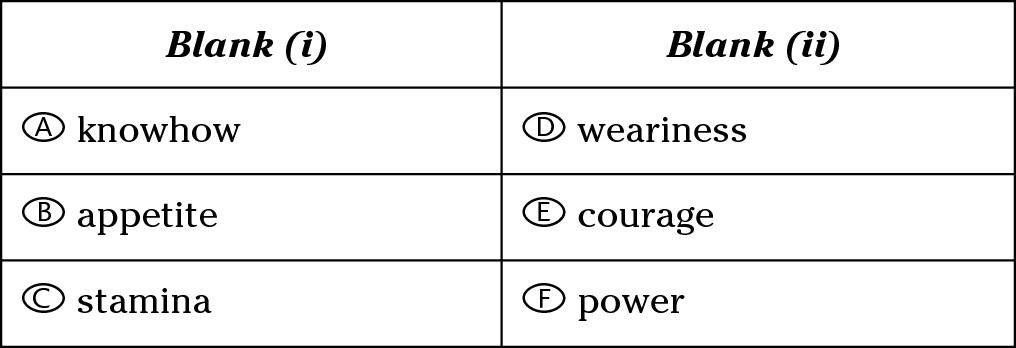
What’s one thing that helps and another that hinders a triathlete? Strength and fatigue are good choices. In the first column, you can rule out knowhow. Either of the remaining words, appetite (in the sense of desire) and stamina, could fit, but stamina is more closely related to strength. In the second blank, you look for a word like fatigue, and weariness is clearly the closest match. Correct answers: Choices (C) and (D).
3. Although dismayed by the pejorative comments made about her inappropriate dress at the diplomatic function, Judy (i)_____ her tears and showed only the most calm and (ii)_____ visage to her critics.

If Judy had a calm and (something) visage (a form of the word vision; a countenance, or facial expression), the (something) must go hand in hand with calm. Although it doesn’t have to be an exact synonym, the second word can’t be an antonym either. Look for a word that means calm. Placid means calm and tranquil, as you know from the root plac, meaning peace (as in placate). Check the remaining two choices in the second column: Incensed means upset, burning mad (think of burning incense); articulate means well-spoken. Her visage (or facial expression) wouldn’t be well-spoken, although Judy herself may be. Placid is best for the second word, so now find something suitable for the first word. Monitoring or succumbing to (giving in) her tears is unlikely to make Judy appear calm and placid, but suppressing her tears will. The correct answers are Choices (A) and (F).
4. There are those writers who carp and (i)_____ about the current depressed state of our economy. However, many people insist that such writers don’t speak for the common man (or woman) who believes in the (ii)_____ of the nation and the (iii)_____ of its future.

Try to predict the words that fit into the blanks. Here, you can predict that the first word must be something bad (because the writers are carping, or griping, about a depressed economy). The word however cues you that the next two words are going to be more optimistic. In the first column, look for a word with a negative connotation; neither laud (to praise, as in applaud) nor ponder (as in wonder) meet that requirement. Only grouse (meaning to complain or grumble) fits with carp. In the second column, you can rule out chaos (confusion and disorganization) because it’s not positive and generosity (charitableness) because that’s not necessarily going to help turn around a depressed economy. Resilience (the ability to recover) is the best choice there. As for the third word, lampoon means to ridicule (think of the satirical magazine National Lampoon), and morbidity (desperation) conveys a very negative tone, so you can eliminate both of those choices and choose security, which describes a positive state for a future. Correct answers are Choices (B), (D), and (H).
5. Although often writing of (i)_____ activities, Emily Dickinson possessed the faculty of creating an eclectic group of characters ranging from the reticent to the epitome of (ii)_____.
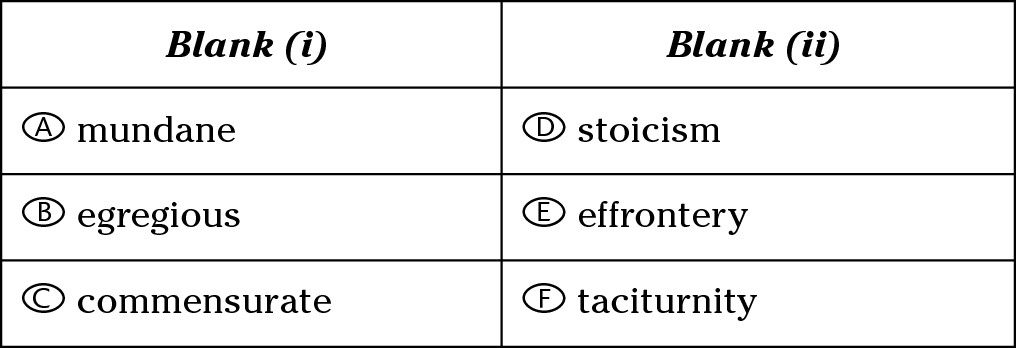
If you know that reticent means shy and holding back, you can predict that the second blank must be the opposite of that, something bold and forward. Effrontery is shameless boldness and audacity. You have effrontery when you ask your boss for a raise right after he or she chews you out for bungling a project and costing the company money. Effrontery is the only word that fits the second blank. Taciturnity is the noun form of the word taciturn, meaning quiet, not talkative, not forward. Stoicism is not showing feelings or pain.
The transition word although tells you that the first blank must be the opposite of eclectic, which means from multiple sources, or in this case, diverse. Mundane means common, which is a good opposite of eclectic. Mundane activities are day-to-day tasks, nothing exciting like winning a lottery or visiting Antarctica. Egregious means terrible or flagrant. An egregious mistake is right out there for the world to see, not nearly the opposite of eclectic, so you can eliminate it. Commensurate means equivalent to or proportionate (your score on this section is commensurate with your vocabulary); again, this word isn’t an opposite of eclectic, so cross it off the list. The correct answers are Choices (A) and (E).
6. Unwilling to be labeled _____, Gwenette slowly and meticulously double-checked each fact before expounding upon her theory to her colleagues at the convention.
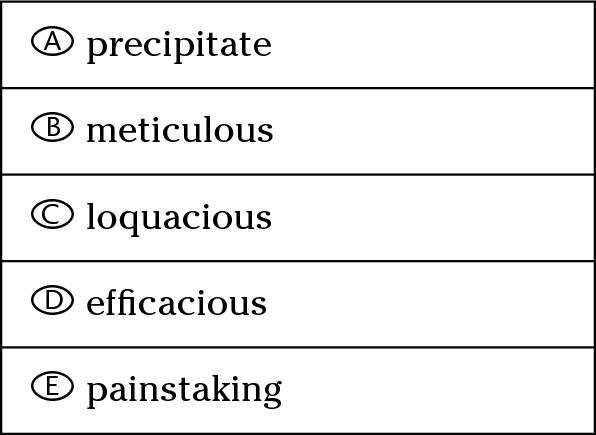
First, break the sentence into two parts at the comma. Using the word unwilling in the first part, you know that the second part is going to be the opposite meaning of the word required to complete the first part. Now work from the second part back. The gist of the second part is that Gwenette is being careful, so now all you need to do is find the one word in the list that’s closest to meaning careless.
The key here is pure vocabulary, but if you don’t have a clue what any of the words mean, don’t get stuck on it — just guess and go.
Precipitate means overly quick, leaping before looking. This word is a perfect fit. Correct answer: Choice (A).
If you don’t want to be labeled precipitate, confirm your answer by eliminating the four other choices. Loquacious means overly talkative, something Gwenette doesn’t want to be labeled as but has little relevance to preparing her theory. Meticulous and painstaking mean careful with detail, paying close attention, so they’re both the opposite of what you’re looking for. Efficacious means efficient and effective; all of which Gwenette does want to be labeled.
Sentence Equivalence questions
Directions: Select the two answer choices that, when used to complete the sentence, fit the meaning as a whole and produce two completed sentences that are alike in meaning.
7. A successful business-process _____designed to streamline existing operations will, by its nature, also support the company’s strategic planning.
A reaction
B management
C plan
D initiative
E supply chain
F method
Is this business-process thing a new event or ongoing? That it affects “existing operations” tells you that it doesn’t currently exist and is, therefore, new. Look for words that suggest an early phase of development. Reaction obviously doesn’t fit. Management and supply chain are business-sounding words that don’t suggest anything new. Method also isn’t distinctly new (a method could have been around for a while). The words plan and initiative suggest something in the early stages of development. Correct answers are Choices (C) and (D).
8. The sea tortoise, though lumbering and slow on land, can move with _____ speed and agility in water.
A surprising
B actual
C according
D defiant
E unexpected
F unequivocal
If the tortoise is lumbering and slow on land, wouldn’t you expect it to be slow in water, too? The crocodile, for example, is fast and nimble in either medium. In this sentence, however, the transition word though tells us that the tortoise’s speed and agility in water is a surprise. The words actual, according, defiant, and unequivocal don’t suggest any sort of surprise. The correct answers are Choices (A) and (E).
9. The speaker, ironically, _____ the very point he had stood up to make, and hurriedly sat down, hoping no one had caught his solecism.
A prognosticated
B divulged
C refuted
D countered
E duplicated
F ferreted out
A solecism is an inconsistency, such as a mistake. From the context of the sentence, you can gather that a solecism is something negative because the speaker hoped no one had noticed it.
To refute is to disprove or show to be false. To counter is to contradict. It’d be ironic (the opposite of what’s expected) if the speaker disproved or contradicted the very point he stood up to make. Therefore, the correct answers are Choices (C) and (D).
Take a moment to go through the other words to increase your vocabulary. To prognosticate is to predict. Pro- means before, gnos means knowledge, and -ate means to make. To prognosticate is to “make knowledge before,” to predict.
The second choice, divulge, is to reveal. Though this word seems to fit, it doesn’t support the intended meaning of the sentence. To divulge the very information you stand up to say isn’t ironic, it’s normal.
The second to last choice, duplicity, is an interesting word. The root dup means double, but duplicity isn’t “doubleness” in the sense of two of something. Duplicity is deception, being two-faced. A traitor is noted for his or her duplicity. And to ferret out is to search diligently, as a detective ferrets out clues to help his client. You ferret out the tips and traps scattered throughout these explanations to remember them.
10. Dismayed by the _____ evidence available to her, the defense attorney spent her own money to hire a private investigator to acquire additional evidence.
A dearth of
B scanty
C vestigial
D immense
E concrete
F impartial
Predict words to fit in the blanks. If the attorney is dismayed by evidence and hires an investigator to get more evidence, she must not have had much evidence to begin with. You can predict that the first word means not very much. Scanty means barely sufficient and a dearth of is a lack of, which are the only two words that fit the blank. So the correct answers are Choices (A) and (B).
As for the remaining words, vestigial means functionless, after much of the original has disappeared; for example, the tailbone of humans is a vestigial tail. Immense means large, just the opposite of what you want. Concrete, in this context, means irrefutable; again, the opposite of what you want. Impartial evidence is neutral, neither good nor bad, which has nothing to do with the amount of evidence.
11. Rather than be decadent, the actor adopted an _____ lifestyle to help him focus on the professional side of his work.
A abstemious
B anachronous
C ascetic
D assiduous
E austere
F avarice
The actor could have adopted any kind of lifestyle, but look for words that indicate the opposite of decadent. Abstemious and ascetic both describe one who practices self-denial, so these words fit. The correct answers are Choices (A) and (C).
As for the remaining words, anachronous describes something out of the proper time, such as if Robin Hood had had a flashlight. Avarice refers to a desire to hoard wealth, so that’s definitely out. Assiduous means hardworking, which may also describe the actor, but you need a word that’s the opposite of decadent. Austere means stern or unadorned, which isn’t quite the opposite of decadent.
12. One who postures as completely fearless is unsurprisingly likely to drop the pretense and show a(n) _____ face.
A artless
B contentious
C craven
D deferent
E mealy-mouthed
F pusillanimous
If someone has a pretense of fearlessness, then behind it is a sense of cowardice. The words craven and pusillanimous both mean cowardly, so the correct answers are Choices (C) and (F).
Artless means honest and natural, which may be the face behind a pretense, but the sentence describes fearlessness. Contentious describes someone willing to stand up for himself, which may be this posturing person, but it, too, wouldn’t be behind a pretense of fearlessness. Deferent means giving in out of respect for another, and mealy-mouthed means insincere, which may refer to the pretense but wouldn’t be behind it.
13. Inspired by their leader’s tirade, the protestors took it upon themselves to continue the _____.
A diatribe
B diffidence
C harangue
D hyperbole
E euphemism
F equivocation
A tirade is a bitter verbal attack, so the protestors could only continue with their own tirades. Diatribe and harangue are synonyms for tirade, making the correct answers Choices (A) and (C).
Diffidence refers to a lack of confidence. Hyperbole is an exaggeration, euphemism is the use of agreeable words in place of offensive language, and equivocation is the use of intentionally vague language.
14. The welfare system, designed to help those who are _____, is in need of reform.
A indigent
B mendacious
C mendicant
D misanthropic
E morose
F quiescent
The welfare system was designed to help those who are poor or destitute. Indigent and mendicant are synonyms for destitute, making the correct answers Choices (A) and (C).
Mendacious means dishonest, misanthropic means antisocial, morose means sullen, and quiescent means at rest.
15. As a rule, the company hires only _____ engineers, believing years of experience tend to jade engineers, blinding them to new ideas.
A felicitous
B fledgling
C gregarious
D insensible
E ingenuous
F neophyte
If the company wants only inexperienced engineers, then the engineers would have to be beginners or novices. Fledgling and neophyte fit this meaning, making the correct answers Choices (B) and (F).
Felicitous means suitable or appropriate, which may be true of the desired engineers but doesn’t support the sentence’s purpose of hiring novices. Gregarious means sociable and outgoing, which is also possibly true of the new hires but doesn’t support the sentence’s purpose. Insensible means unresponsive. Ingenuous means naive and trusting, which is close, but a company wouldn’t necessarily look to hire someone who is naive.
16. Many _____ bloggers continue to aver countless half-truths, despite ample evidence to the contrary.
A dissonant
B doctrinaire
C dogmatic
D ebullient
E eclectic
F erudite
Aver means to declare something to be true. If bloggers declare half-truths to be true despite the contrary evidence, then they’re ignoring the evidence. Doctrinaire and dogmatic fit this meaning, making the correct answers Choices (B) and (C).
Dissonant means ill-fitting, which may be true of the bloggers but doesn’t address their aversion to the evidence. Ebullient means buoyant in disposition, which also doesn’t fit. Eclectic means derived from various sources, and erudite means educated.
17. The buffalo, once _____ to this area, has been hunted nearly to extinction.
A endemic
B indigenous
C quintessential
D truculent
E veracious
F viable
The buffalo must have originated and lived in the area. Endemic and indigenous fit this meaning, making the correct answers Choices (A) and (B).
Quintessential refers to a perfect state, truculent means poor behavior, veracious means truthful and accurate, and viable means practical.
18. The _____ is one who spares no time for conciliatory gestures.
A churl
B cohort
C consummate
D contrite
E coy
F curmudgeon
Conciliatory refers to an effort to bring peace, as in the word reconcile. The sentence is talking about a person, because the pronoun who can only refer to a person — never a thing.
What kind of person would be too impatient to reconcile with those around him? One who is ill-tempered, such as a churl or a curmudgeon. The correct answers are Choices (A) and (F).
A cohort is a group of people with something in common. Consummate means complete and perfect, certainly not the case here. Contrite refers to one who is filled with sorrow for a wrongdoing, and coy means shy or modest.
19. A talent for easy conversation can help one build relationships, but too much can make one appear _____ and have the opposite effect.
A abstruse
B garrulous
C loquacious
D lugubrious
E ponderous
F recondite
If too much conversation can be bad, then find words that mean too talkative. Garrulous and loquacious refer to one who talks to the point of being meddlesome, so Choices (B) and (C) are the correct answers.
Abstruse and recondite refer to one who isn’t easily understood, and they wouldn’t necessarily be the bad effect of talking too much. Lugubrious means sad and mournful, which is certainly not the case here. Ponderous refers to one who is dull or moves slowly.
20. Beneath the _____, the man is something else entirely.
A disingenuousness
B divergence
C exculpation
D superciliousness
E superfluousness
F veneer
If the man puts up a false front, disingenuousness and veneer both accurately describe this person. The correct answers are Choices (A) and (E).
Divergence refers to straying away from the main point of a discussion. Exculpation means no longer considered guilty. Superciliousness would be on one who is disdained and scorned. Superfluousness refers to someone or something that’s extraneous.

 To interpret a sentence, read it carefully, using keywords to understand the
To interpret a sentence, read it carefully, using keywords to understand the 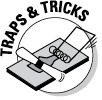 While interpreting the sentence, don’t look at the answer choices! Each puzzling answer choice not only completes the meaning of the sentence but also gives the sentence a very different meaning. Trying out answer choices before interpreting the sentence turns an easy question into a hard one and shifts your focus away from the sentence itself. Instead, read the sentence carefully and figure out what it’s trying to say.
While interpreting the sentence, don’t look at the answer choices! Each puzzling answer choice not only completes the meaning of the sentence but also gives the sentence a very different meaning. Trying out answer choices before interpreting the sentence turns an easy question into a hard one and shifts your focus away from the sentence itself. Instead, read the sentence carefully and figure out what it’s trying to say.